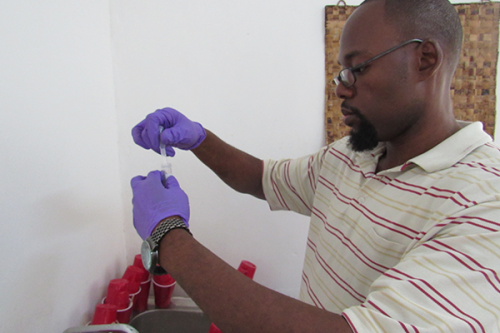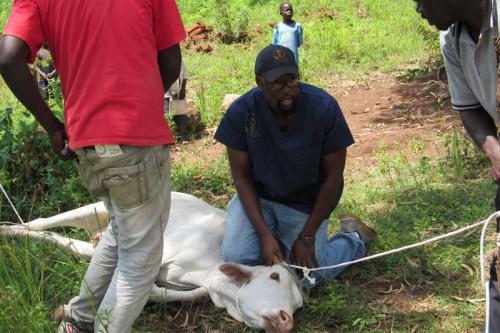Dr. Tyrell Kahan

Dr. Tyrell Kahan, DVM, MDP, DACVPM is a Livestock Research Advisor with USAID. He’s also a proud Floridian and loves goats! After veterinary school, Tyrell worked in small animal clinical practice for a few years before he pursued a Masters in Development Practice at Emory University. Passionate about International Development, Tyrell’s experience as an AAAS S&T Policy Fellow helped him gain valuable experience in the federal government, working with the Bureau for Food Security at USAID. We loved catching up with Tyrell and learning about his perspectives on the value of mentorship and accurate self-reflection to identify what to pursue in life.
Veterinary School & Year Graduated: University of Florida, 2011
Additional Degree: Emory University, Master in Development Practice, 2016
Questions and Answers
- Tell me about your most challenging and rewarding veterinary jobs or work experiences.
- My current position is the most challenging I’ve had so far. I currently work as a livestock advisor for the Bureau for Resilience and Food Security at USAID which mainly involves managing research projects. As far as challenges, one of the aspects of my job that has been the most difficult getting used to is the large time lags between action and outcomes, which is much larger than what you see in practice. When you're in practice, there are more immediate feedback loops that let you know how you're doing from day to day whether that be cure rates or client satisfaction. In my current position, I may not see any impact from my work for months or years, especially when you're talking about strategy development and policy influence. Working in policy and navigating bureaucracy is challenging but also rewarding and I have grown to appreciate the process. “Knowing that I’m making a difference, similar to what I did when I was in practice, just on a different scale, is what keeps me going.”
- What did you love about the position or experience?
- I really loved my time working in practice, especially working with compassionate pet owners to provide them and their pets relief. I also really enjoyed the daily interactions with clients and I miss that in my current position.
- Tell me about your journey to get to that point in your life.
- I always wanted to go into a service-based career; I was raised with a philosophy of giving, helping, and serving. In high school, I worked as a vet assistant which secured my interest in a career that involved animal health. During undergrad, I became involved with goat research. While working on a research farm, I observed Ph.D.s were reliant upon veterinarians if the animals in their study became ill. From that point, I decided to pursue a Ph.D. and a DVM. When I started vet school, I had all intentions of signing up for a dual degree DVM/Ph.D. program but the program was discontinued during my first year in school. Upon graduation, I couldn’t seem to find a large animal vet position, and I eventually got a job in a small animal practice that also saw goats. After working there for a few years, I realized that I enjoyed it but it just wasn’t my passion. I began exploring career options, which eventually led to a drive up to Washington, DC, where I talked to someone that recommended that I pursue the AAAS S&T Policy Fellowship as an entry point into a federal career. I also decided to return to school, and obtain a Masters in Development Practice (MDP) at Emory University. After completing my masters, I was accepted into the AAAS S&T Policy Fellowship, which eventually led to my current position.
- As a veterinary student, did you ever imagine yourself taking this journey and having these professional experiences?
- Not at all. I thought that I would get my PhD and go into research but when the dual degree program was discontinued that plan changed. Also, I remember telling myself while in high school that I wouldn’t be able to envision what my ultimate career would be. I determined that it would be something I couldn’t imagine at the time. Fortunately, I accomplished that!
- In retrospect, what do you wish you’d known as a veterinary student or early in your career?
- I wish I knew more about smart financial planning and how to manage student loans and debt. I also wish I knew of the multitude of career options that are available to those with veterinary training. I came to the realization later in my life that school actually trains us how to think and tackle problems. The skills that I learned, even if they were specifically focused on veterinary practice, are applicable across a range of careers and tasks. It is very important to me to not ever feel boxed into one type of job or trapped at a particular company for any reason, even if it is something that I had put a lot of effort into pursuing. I am glad my veterinary training has afforded me this luxury.
- Would you have changed anything about your time in veterinary school?
- Looking back, there isn’t really anything I would change. In vet school, the push for food animal vets while I was in vet school was a little frustrating because I couldn’t find a job once I graduated. However, it all worked out in the end, and I’m happy about my journey.
- Would you have changed anything about your career path since graduating?
- Sometimes I wonder if doing a dual DVM/MPH program would have been more cost-effective but overall I’m happy with the way things have gone.
- Did you have any mentors or role models along the way that helped or inspired you? Please provide an example of how they helped you or what qualities they had that made them a good mentor? How did you find them?
- While working in goat research I met my first black veterinarian who became a mentor and eventually helped me get a job as an Extension Agent before vet school. The CEO of Vets Without Borders-US was another impactful mentor who presented me with opportunities along the way that were critical to my current successes. I think good mentors should provide advice as well as help with networking and facilitating connections with other professionals.
- Tell me about any pivotal moments or key turning points that shaped your career.
- Becoming involved with goat research was a big turning point in terms of figuring out how I wanted to go forward with my career. It was that experience that opened my eyes to international issues. Traveling to and working in Liberia with Veterinarians Without Borders was another experience that helped me figure out that I want to have an international focus in my work. Going back to school and getting my MDP and applying for the AAAS S&T Policy Fellowship were also influential experiences.
- Tell me about one or two challenges, setbacks, or obstacles that you faced along the way on your professional journey. How did you address those?
- When I was first in the job market it was tough not getting callbacks. One time I didn’t hear back from a prospective employer for over a year. For a while it felt like there were limited career options for veterinarians but my perception about that has changed.
- What are the most important lessons you learned as a veterinarian, and still remember today, and would want to tell vet students about.
- It’s so important to know how to articulate and market your generally applicable skills to get the jobs you want. I also think it’s important to expand the scope of what you can see yourself doing.
- What’s been the biggest highlight of your career so far?
- Landing my current job has been a pretty big highlight. Besides that, it’s hard to articulate other highlights. Many of the projects I manage are on such long timelines that it is sometimes difficult to identify distinct accomplishments.
- Is there anything else you’d like to tell me that you think would be helpful or relevant to veterinary students or early-career veterinarians?
- What people actually are looking for on your resume and your skill set are those things that are a little bit closer to soft skills. Your leadership capabilities, your ability to handle budgets, teamwork, and project management are what people are looking for. It is also important to describe and highlight your relatable, generally applicable skills including your capacity as a systems thinker. There are many parallels between engaging body systems like veterinarians are trained to do and engaging social systems and organizational systems As you look for the next opportunity in your career, be willing to take a chance, try it out, and figure out if it works for you or not. Also try to keep an eye on your network and continue to expand it whenever you have an opportunity.

